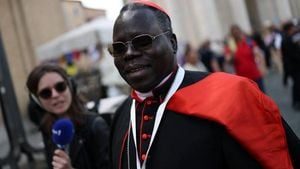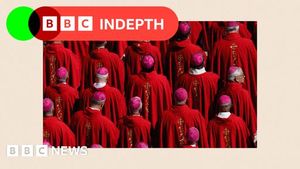With the 2024 elections rapidly approaching, Donald Trump's campaign is making its final push, blending tried-and-true rally-cries with some quite extraordinary tactics. A combination of unwavering loyalty, resilience during political scandals, and the return of key allies from the past is creating both buzz and tension around the campaign as Election Day looms on the horizon.
Stepping back from the noise, one can't help but notice the strategic maneuvers employed by Trump's campaign to reconnect with undecided voters across several battleground states. With mounting speculation on swing state dynamics, particularly Arizona, campaign insiders reveal how they are crafting their strategies to resonate with the electorate.
Inside the campaign's Maricopa County field office, workers are engaged not just in traditional methods of outreach, like door-to-door canvassing and phone banking, but they are also leveraging social media to engage people who might otherwise be apathetic. The latest poll results indicate remarkable tightness between Trump and his opponent, tied at 48 percent each, making every encounter with voters all the more significant. The Trump campaign believes embracing unconventional measures will push the needle just far enough to secure pivotal wins.
Interestingly, Trump's campaign benefits from the recent release of Stephen K. Bannon. The former White House chief strategist, who has reconvened after serving time for contempt of Congress, brings along strong messaging and the audacity of certain right-wing narratives. Supporters anticipate his return will revitalize some enthusiasm among disenchanted voters who admire his aggressive stance on partisan issues. Trump's entourage embraces Bannon's return, positioning him as someone who can rally the base during this intensity-filled final week.
Bannon's reintegration exemplifies the broader strategy drawing from loyalty. His expertise, albeit controversial, aligns perfectly with Trump's objectives as images of camaraderie surface. Trump believes Bannon’s ability to galvanize support translates directly to the polls, and with Bannon’s elaborate messaging machine back online, the campaign can breathe new life. Campaign representatives are already lauding Bannon for boosting visibility on social media platforms.
This return to right-wing media influence includes Trump’s latest declaration about potentially pardoning individuals involved with the January 6 insurrection should he reclaim the presidency—an announcement quickly heralded by his most zealous supporters. Loyalists, many of whom had previously benefited from Trump's pardons, are rallying around this redefinition of loyalty, positioning themselves as true believers willing to fight for his vision.
One cannot discuss Trump's final push without addressing the significant number of pardons he issued during his time in office—about 237 of them. Many were for allies and figures close to him. Some of the pardoned individuals have already returned to the political arena, seemingly reinvigorated by Trump’s favor and their newfound ability to speak their minds publicly. Academics observe this group is poised for resurgence—ready to implement strategies aimed at undermining opponents and boosting Trump’s populist appeal.
Recall individuals like Michael Flynn and Steve Bannon, who, fueled by their pardons, have mobilized to brush aside political opposition by promoting controversial theoretical concepts rooted firmly within the MAGA narrative. Flynn even tours through the country, speaking at events and promoting various conspiracies to seemingly whitewash the more malignant aspects of the Trump administration, rallying supporters against perceived threats.
Dan Scavino, the former White House social media director, described it aptly: "Loyalty is power among those who have formed connections through the Trump machine.” Such sentiments display loyalty and litigation interlaced as Trump prepares to mount another term. Reports of individuals like Roger Stone reaping the rewards of their loyalty emerge, showcasing how the legacy of Trump’s favor continues to reward those who play by the rules of the party.
The dynamics of the campaign show Trump leaning heavily on his past administration, which many authors and political analysts suggest resembles the edifices of authoritarian regimes. Serious conversations about hyper-political loyalty, perceived criminality, and conspiracy charges loom large. Trump’s own endeavors to rewrite history and reshape narratives has led to open admonishments from former allies and generals who have voiced concern about the ramifications of re-electing someone who appears to have increasingly authoritarian tendencies.
Former chief of staff John Kelly openly discussed Trump’s inclination toward dictatorial power, stating, “He has said he prefers the dictator approach to government.” These sentiments, echoed by retired generals, grasp at voters' sensibilities, shrouded within echoes of what could potentially represent a fascist transition if supportive voices continue to thrive.
The final weeks of this campaign, then, come alive not only with chants and rallying cries but also with warnings against despotism and authoritarian control. Polls indicate divisions among undecideds—those apprehensive of both candidates—with electoral math lending itself to dire warnings of Trump’s grip should regaining power materialize.
It seems American politics is witnessing, almost fevered, the roots of populism sprouting from tumultuous paths. If Trump’s surrogates and pardoned allies gather enough momentum, they may very well write the next chapter of U.S. history after November. Whether this final push will lead them to renewed notoriety—or ignite stronger opposition—remains to be seen, yet the stakes sit enormous, amplified by the voices determined to spur their vision of America’s future.



